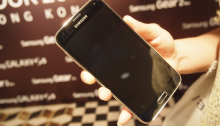Samsung had been quite sensible with the Galaxy S3 and the mobile race- they didn’t compete using battery-draining killer specs. Instead, they began a whole new era in the race- the Sensor Wars.
Sure everyone was expecting a never before seen design that’ll beat the current and near-future iPhones and it being made of materials never thought possible molded in shapes that even Apple may feel envious of.
But no, and this here is the one and only reason everyone came away disappointed. And since the hardware isn’t technologically, on the surface, much more advanced than its nearest rival- the HTC One X- people had no reason to call home about.
But in doing so, it would seem that that group of people has not realised the significance of the Galaxy S3’s new software additions. Or more precisely, how the new software makes better use of all the available but thus far waste hardware sensors.
The Samsung Galaxy S3 is available for pre-order on amazon.com.
Samsung emphasises that the S3 is human-centric. I say the S3 is nearly a human being in certain sense in that it mirrors a lot of the human sensory functions-
- it can see your eyes using its front mounted camera and decide when the screen is to be dimmed and turned off
- hear you with its microphone to accept a wide range of powerful and customisable voice commands, able to e.g. unlock the phone, take pictures etc.
- feel* you with its touch screen.. wait that doesn’t count. actually the S3 senses motion (i presume) using its accelerometer when you pick it up. Through the use of Smart alerts, it then vibrates the phone if there are any notifications not yet cleared.
What’s not been mentioned yet is its use of the Barometer sensor. Perhaps one day it’ll predict short term weather and make guess work of its altitude?
While these all genuinely paves the way and sets a standard on how all other smartphones might like to evolve imitate innovate, the problem the S3 itself may face is having technology too far ahead of its time. While all these sensors be their smart self, the high cost comes with shortened battery life. Camera monitoring your eyes? battery. Microphone on standby listening for your commands? battery. Accelerometer on standby waiting to feel you picking it up? battery. And once these features become popular with the public, other companies are likely to add their own variations in not time. Because it’s that easy- the hardware, the sensors are all there already. It’s just that none of them have innovated and made creative use of them. On the other side of the coin, this is great for competition and harkens back to what I said about the Sensor Wars.
The S3’s battery standing at 2100 mAh, it would seem has not been designed to take this kind of drainage nor has Samsung kept up on its word to improve battery life this year. Yes the quadcore processor is HKMG and is optimized against power leakage etc but the sensors themselves will require battery.
All in all, the Galaxy S3 does put the “smart” back into “smartphone”. Let’s hope that the battery life standards are not the same as what’s been smartphone-standards of yester-year. Reviews for the device should be flowing in thick and fast all over the internet in the coming days- we’ll know soon enough.
The Samsung Galaxy S3 is available for pre-order on amazon.com.



